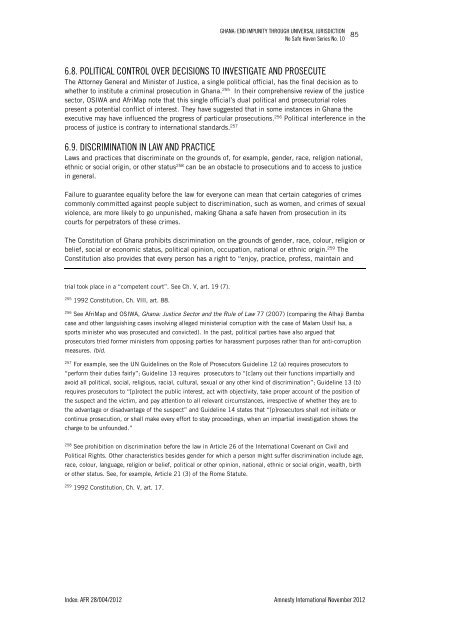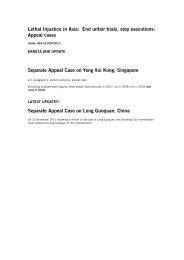Ghana - Amnesty International
Ghana - Amnesty International
Ghana - Amnesty International
Create successful ePaper yourself
Turn your PDF publications into a flip-book with our unique Google optimized e-Paper software.
GHANA: END IMPUNITY THROUGH UNIVERSAL JURISDICTIONNo Safe Haven Series No. 10856.8. POLITICAL CONTROL OVER DECISIONS TO INVESTIGATE AND PROSECUTEThe Attorney General and Minister of Justice, a single political official, has the final decision as towhether to institute a criminal prosecution in <strong>Ghana</strong>. 255 In their comprehensive review of the justicesector, OSIWA and AfriMap note that this single official’s dual political and prosecutorial rolespresent a potential conflict of interest. They have suggested that in some instances in <strong>Ghana</strong> theexecutive may have influenced the progress of particular prosecutions. 256 Political interference in theprocess of justice is contrary to international standards. 2576.9. DISCRIMINATION IN LAW AND PRACTICELaws and practices that discriminate on the grounds of, for example, gender, race, religion national,ethnic or social origin, or other status 258 can be an obstacle to prosecutions and to access to justicein general.Failure to guarantee equality before the law for everyone can mean that certain categories of crimescommonly committed against people subject to discrimination, such as women, and crimes of sexualviolence, are more likely to go unpunished, making <strong>Ghana</strong> a safe haven from prosecution in itscourts for perpetrators of these crimes.The Constitution of <strong>Ghana</strong> prohibits discrimination on the grounds of gender, race, colour, religion orbelief, social or economic status, political opinion, occupation, national or ethnic origin. 259 TheConstitution also provides that every person has a right to “enjoy, practice, profess, maintain andtrial took place in a “competent court”. See Ch. V, art. 19 (7).2551992 Constitution, Ch. VIII, art. 88.256See AfriMap and OSIWA, <strong>Ghana</strong>: Justice Sector and the Rule of Law 77 (2007) (comparing the Alhaji Bambacase and other languishing cases involving alleged ministerial corruption with the case of Malam Ussif Isa, asports minister who was prosecuted and convicted). In the past, political parties have also argued thatprosecutors tried former ministers from opposing parties for harassment purposes rather than for anti-corruptionmeasures. Ibid.257For example, see the UN Guidelines on the Role of Prosecutors Guideline 12 (a) requires prosecutors to“perform their duties fairly”; Guideline 13 requires prosecutors to “[c]arry out their functions impartially andavoid all political, social, religious, racial, cultural, sexual or any other kind of discrimination”; Guideline 13 (b)requires prosecutors to “[p]rotect the public interest, act with objectivity, take proper account of the position ofthe suspect and the victim, and pay attention to all relevant circumstances, irrespective of whether they are tothe advantage or disadvantage of the suspect” and Guideline 14 states that “[p]rosecutors shall not initiate orcontinue prosecution, or shall make every effort to stay proceedings, when an impartial investigation shows thecharge to be unfounded.”258See prohibition on discrimination before the law in Article 26 of the <strong>International</strong> Covenant on Civil andPolitical Rights. Other characteristics besides gender for which a person might suffer discrimination include age,race, colour, language, religion or belief, political or other opinion, national, ethnic or social origin, wealth, birthor other status. See, for example, Article 21 (3) of the Rome Statute.2591992 Constitution, Ch. V, art. 17.Index: AFR 28/004/2012 <strong>Amnesty</strong> <strong>International</strong> November 2012
















